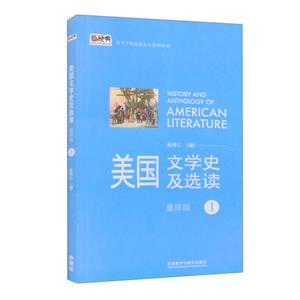
作者:吴伟仁
页数:392
出版社:外语教学与研究出版社
出版日期:2021
ISBN:9787513531719
电子书格式:pdf/epub/txt
内容简介
《英国文学史及选读》共两册,根据英国文学历史的顺序结合作品选读编写而成,是一套”史”、”选”结合的教材。在历史部分,对英国文学史的每个阶段作了简明扼要的概述,而在作品选读部分则尽可能遴选了文学目前的重要作家和重要作品。教材内容丰富,观点正确,选文具有代表性,可作高校英语专业文学课程的课本或参考书,也是广大英美文学爱好者的理想读物。本书是二册,涵盖19世纪至20世纪的英国文学。
作者简介
吴伟仁,汉族,1913年10月生于河北邯郸。河北师范大学外国语学院(原外语系)英语教授、全国高等学校外国文学教学研究会理事。长期从事英语语言文学教学和科研工作。主要论著有《意象派和美国现代诗歌》等。
本书特色
适读人群 :学生,教师《英国文学史及选读》自出版以来,重印四十余次,畅销不衰,深受欢迎。
目录
Chapter 19 William Wordsworth
Tintern Abbey
She Dwelt among the Untrodden Ways
I Travelled among Unknown Men
I Wandered Lonely as a Cloud
Sonnet: Composed upon Westminster
Bridge, September 3, 1802
Sonnet: London, 1802
The Solitary Reaper
Chapter 20 George Gordon, Lord Byron
When We Two Parted
She Walks in Beauty
Sonnet on Chillon
Childe Harold’s Pilgrimage: A Romaunt
Don Juan
Chapter 21 Percy Bysshe Shelley
Ozymandias
A Song: “Men of England”
Ode to the West Wind
The Cloud
To a Sky-Lark
Chapter 22 John Keats
On First Looking into Chapman’s Homer
Ode to a Nightingale
Ode on a Grecian Urn
To Autumn
Bright Star
Chapter 23 Walter Scott
Ivanhoe
Rob Roy
Chapter 24 Jane Austen
Pride and Prejudice
Chapter 25 Charles Lamb
Dream-Children: A Reverie
Poor Relations
Part VI The Victorian Age (1837?C1901)
Chapter 26 Charles Dickens
The Posthumous Papers of the Pickwick Club
Oliver Twist
Chapter 27 William Makepeace Thackeray
Vanity Fair: A Novel without a Hero
Chapter 28 George Eliot
Adam Bede
Chapter 29 Charlotte Bront? and Emily Bront?
Jane Eyre
Wuthering Heights
Chapter 30 Thomas Hood
The Song of the Shirt
The Bridge of Sighs
Chapter 31 Alfred, Lord Tennyson
Ulysses
Break, Break, Break
Crossing the Bar
Chapter 32 Robert Browning
My Last Duchess
Home-Thoughts, from Abroad
Chapter 33 Elizabeth Barrett Browning
Sonnets from the Portuguese
Part VII The 20th Century
Chapter 34 Thomas Hardy
Tess of the D’Urbervilles
The Son’s Veto
Chapter 35 John Galsworthy
The Forsyte Saga
The Man of Property
Conscience
Chapter 36 Oscar Wilde
The Picture of Dorian Gray
Chapter 37 George Bernard Shaw
Mrs Warren’s Profession
Chapter 38 D. H. Lawrence
Sons
节选
Romanticism as a literary movement came into being in England in the latter half of the 18th century. It first made its appearance in England as a renewed interest in medieval literature. The movement was ushered by Thomas Percy (1729-1811), James Macpherson (1736-1796) and Thomas Chatterton (1752-1770). William Blake and Robert Burns represented the spirit of what.is usually called Pre-Romanticism, With the publication of William Wordsworth’s Lyrical Ballads (1798) in collaboration with Samuel Taylor Coleridge, Romanticism began to bloom and found a firm place in the history of English literature. In fact, the first half of the 19th century recorded the triumph of Romanticism. As is known to all, literature develops with the development of the society, and is often under the influence of social ideologies, especially of politics which is the most decisive; literature reflects the mental attitudes of a time and a nation. The class struggles motivate the development ofliterature.And economics is also an important factor in the development of literature.These are true of the literature of all countries. The English Romanticism is no exception. It was greatly influenced by the Industrial Revolution and the French Revolution. After the Industrial Revolution, Britain became the “workshop of the world” and the English bourgeoisie fattened on world trade, plunder and colonisation. No country was strong enough to compete with England. The Industrial Revolution pushed the bourgeoisie to the dominant position in the country. It became the ruling class. The aristocratic class retained some prestige and influence in social life and was still prominent in Parliament and bureaucracy, but it had to submit to the rising, powerful bourgeoisie. As the victim of the “Enclosure Movement”, the peasants became landless and had to find new ways ofliving. Ruined by the rapid capitalist development,the peasants had to wander for work. They became hired workers in the countryside and cities. Thus, a new class, the proletariat, sprang into existence. All the working people lived in dreadful poverty. They were mercilessly exploited and in some places sixteen hours’ labour would hardly pay for the daily bread. In many large cities hungry men and women formed groups against the exploiters. The bourgeoisie got richer and richer while the labourers became poorer and poorer until they could not support themselves.It was under this unbearable economic condition that the workers’ struggle broke out, finding expression in the spontaneous movement of the Luddites (1811-1817), or “frame-breakers”, who broke their masters’ weaving machines to show their hatred of the capitalists and capitalist exploitation. July 14, 1789 saw a great event in Europe. That was the French Revolution.The heavily-exploited Parisian people rose and stormed the Bastille, the symbol of feudalism, The Revolution destroyed the feudal economic base. Its influence swept all over Europe. It is almost impossible for those who had no knowledge of the world history of this period to imagine the extraordinary effect of the French Revolution on the life and thought of England in both cultural and political terms.















